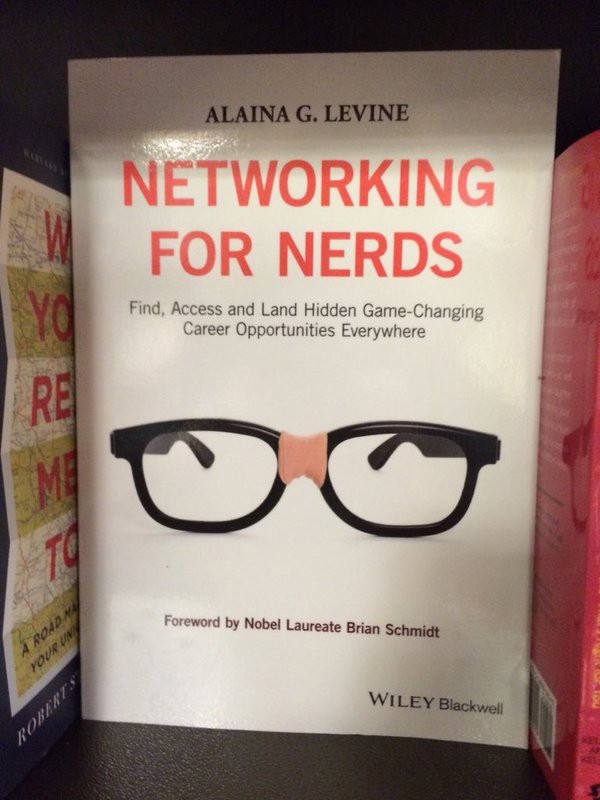Alaina Levine is a UA alumna and author of the bestselling guide “Networking for Nerds.” A speaker, entrepreneur and corporate comedian, Levine graduated in 1996 with a degree in mathematics and again in 1997 with a degree in anthropology. Though she planned to become a mathematics professor, Levine became director of communications for the UA Physics Department right out of college, an achievement owed to her constant networking with UA faculty during her time as an undergraduate. Since then, opportunities came one after the other, leading to the success she expounds on today. With this book, Levine guides readers, particularly students in STEM fields, on how to network as a means to embarking on a successful career. Levine is scheduled to talk on the Science Stage at the Tucson Festival of Books on Saturday at 4 p.m. about “finding your niche in nature.”
The Daily Wildcat: Why did you write “Networking for Nerds”?
Alaina Levine: I wrote this book because nowhere in my mathematics education did any professor ever tell me that I needed to network to find a job, or that I needed to network to get access to hidden jobs or hidden career opportunities. This is unlike business students who, on the very first day of business school at Eller [sic], learn how to network, market themselves and self-promote appropriately. But we don’t talk about that in STEM. Throughout my career, I realize that many of the career opportunities that I was able to find and land were all a result of networking. With this book, I wanted to share what I had learned as a networker with people were never taught to network or know what it is.
What is networking?
Many think networking is schmoozing, or a dishonorable activity where you are trying to mind the other person’s brain for a job, but that’s not true. Networking is actually the most honorable endeavor you could do because it is about building win-win partnerships with another party. So the definition of networking is simply: a spectrum of activities that begin with that first point of contact and aimed for a mutually beneficial alliance in which we are both providing value to each other in various forms over time. And it ends when one or both of us drops dead. That’s networking. Networking asks questions such as, “What can I do for you?” “How can I contribute value to your team?” “How can I inject new solutions or innovations into your organization?” and then “How can I solve your problem?” In a novel way, networking is very honorable and actually inherent to every profession. But particularly to science, engineering and math students, you need the networking so you can find new collaborators and new advances for your career.
What would you, if you could, add to this book?
If I had anything else to add, it would be to make it clear that this book is for any profession. While the book “Networking for Nerds” contains examples and case studies specifically for ‘nerds’ of STEM, the topics, examples, tactics and strategies are relevant to any profession. Yes, I am a science writer, but among many things. The skills I used to land assignments with editors were [like] the skills that I use a professional speaker, or as a corporate comedian or as an entrepreneur.
What do you have to say for STEM students?
I’ll begin with a story. As I was getting ready to graduate in 1996, I expected to be a professor in mathematics. I had a romanticized view of this. I envision myself at a university, or a think tank, where I would be surrounded by intellectuals talking about Knot Theory and formulas, and things of that nature. But suddenly, in 1996, the economy changed. There were jobs all over the place and I was recruited by Intel from the UA Career Fair. And even though I didn’t take the job, I started to realize that my background in mathematics is prized by companies.
And this is what I want science, technology, engineering and mathematics students to know: You are prized and coveted by many, many different industries and companies, not just for your technological skills, but for your ability to solve problems from the ground up, to work in teams, to be a leader and to have communication skills. They want all the skills that we get as scientists, but aren’t necessarily told although gained innately just because of what we are studying. You need to be aware of this advantage.
My career and my success as an entrepreneur, speaker, career consultant and comedian all [comes] back to the education and experiences at the UA. So apply for the fellowships, apply for the awards, take a leadership opportunity, write a column for the Wildcat, do anything you can. Take advantage of every single opportunity because each one leads to another one.
Follow Pearl Lam on Twitter.









